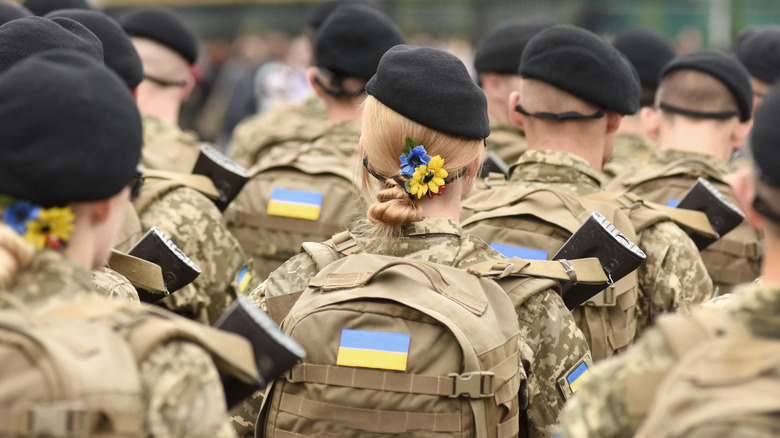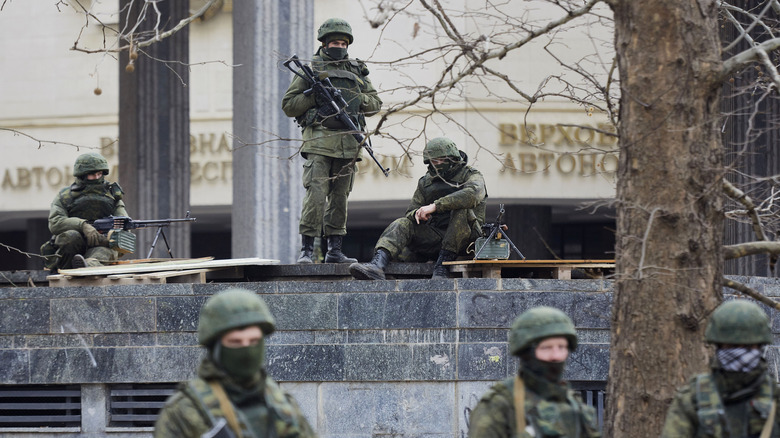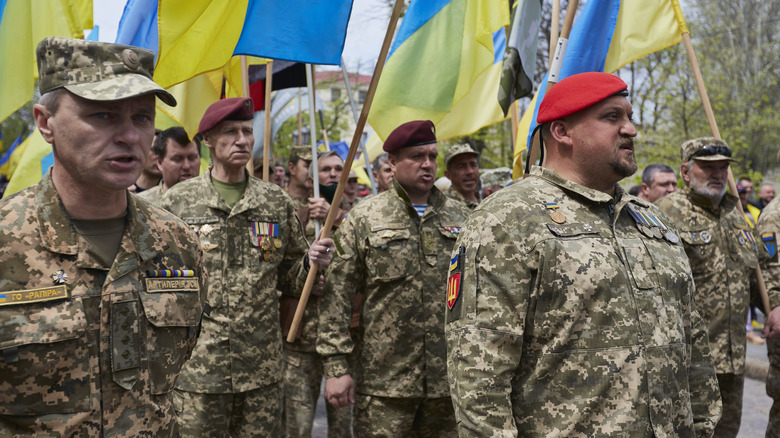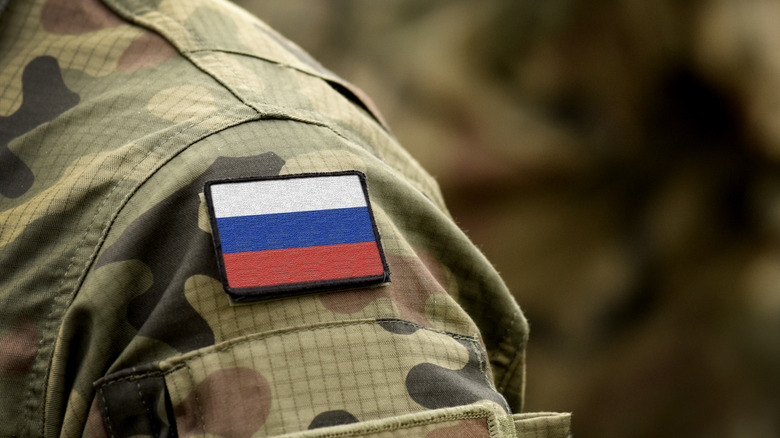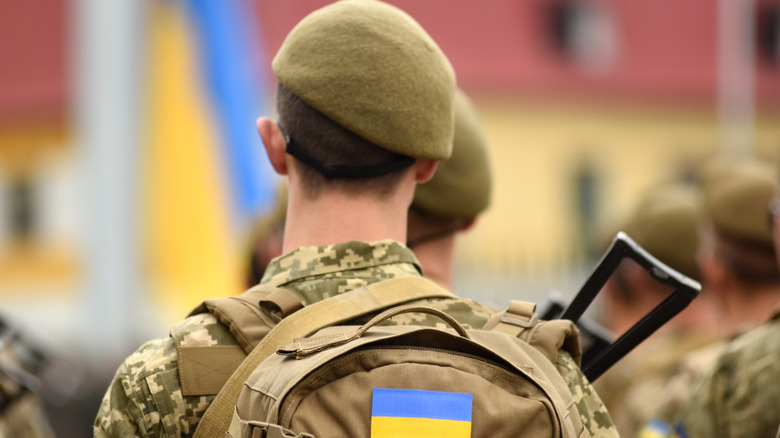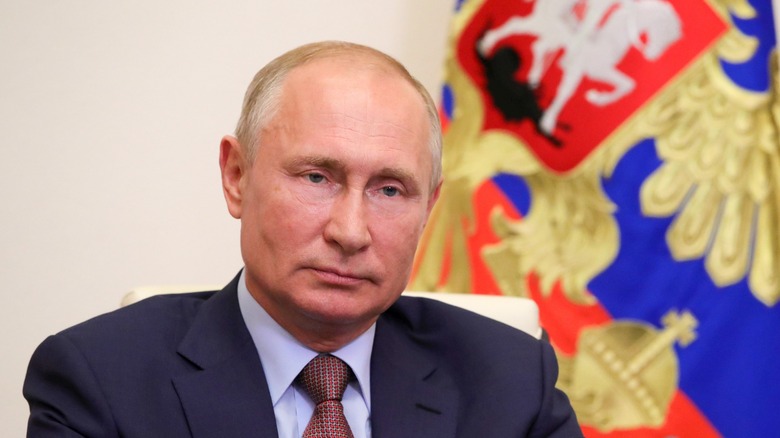Tragic Details About The Last Time Russia Invaded Ukraine
Ukraine is poised between its sometimes-hostile neighbor, Russia, to the east, and the rest of Europe to the west. As such, the Russians have always been interested in keeping the country under its sphere of influence as much as possible, as a sort of hedge between Moscow and the rest of Europe.
For decades, Ukraine (sometimes referred to as "The" Ukraine, although recently the trend has been to not use the definite article, as Time reported) have existed side by side, not always peacefully. The nation of a little more than 43 million people (per World Population Review) was more or less a part of Russia; or more accurately, it was one of 15 republics that was absorbed into the Soviet Union, according to Al Jazeera, before gaining its independence once again with the fall of the Soviet Union.
Since that time, relations between the two countries have been tense, to put it charitably, and in 2014 Russia annexed part of the country and sided with pro-Russian rebels within, as BBC News reported.
In 2014 Russia used trickery
On February 22 and 23, 2014, as Yahoo News reported at the time, Russia annexed the Crimean Peninsula — a part of Ukraine that Russia had considered theirs for decades if not centuries. Initially, Russian troops who participated in the annexation didn't wear insignia identifying them as Russian, allowing Moscow to promote the charade that the events originated and were carried out by elements within Ukraine, although later Russia admitted its involvement. Russia then installed a pro-Russian government in the region.
The reasons for the invasion and annexation are varied and complicated. In the months leading up to the invasion, however, a series of events took place in Ukraine that spurred Moscow's interest in securing its presence there, including, as Britannica notes, efforts by Ukraine to make closer ties to the rest of Europe. However, then-Ukrainian president Viktor Yanukovych bowed to pressure from Moscow and canceled a proposed agreement between Ukraine and the European Union, ultimately spurring protests that led to the overthrow of his government, and allowing Russia the opportunity to move in.
Ukrainian vs. Ukrainian
Though Russia tried, at first, to play off the annexation of Crimea as having been the result of elements within Ukraine, and then later admitted its involvement, the fact remains that some Ukrainians sided with Russia during the crisis. As Interfax News notes, in one instance, a group of about 5,000 pro-independence Ukrainians squared off outside of the Crimean Supreme Council in Simperofol against a few hundred pro-Russian protestors.
Similarly, in the city of Kharkiv, as The Washington Post reported, pro-Russian elements effectively declared the city its own pro-Russian republic, putting the Ukrainians there in an awkward position. "That was a moment when I started packing my things and thinking where to go. knew I couldn't stay here. If Kharkiv becomes Russian, that's it, I'm leaving," said one man.
Conflicts between pro-Russian Ukrainians and pro-Ukraine Ukrainians weren't limited to Simperofol and Kharkiv. As CBS News reported, the two sides were at odds with each other across multiple parts of the country.
An estimated 13,000 people have been killed
In the eight years since Russia last invaded Ukraine, an estimated 13,000 people have died as a result of the conflict, and another 30,000 or so have been injured, based on estimates provided by Radio Free Europe. In 2019, the source estimated that about 4,000 of those death were members of Ukrainian forces along with 5,500 members of "armed groups." At least 3,321 deaths were those of civilians, 298 of which were passengers on board Malaysia Airlines Flight MH17. The flight was later determined by an investigation to have been shot down by a Russian missile as it flew over Ukraine en route from Amsterdam to Kuala Lumpur.
The reason for the on-going injuries and death toll, according to Radio Free Europe, is that Russia has continually fanned the flames of Ukrainian separatist militants by supplying financial, political and military support, helping to sow the unrest among Ukrainian citizens.
International Condemnation
The Russian invasion/annexation of Crimea prompted international condemnation, as The International Business Times reported. Specifically, the United Nations, as it reports on its website, put forth a resolution calling on member nations not to recognize Russian authority in the region; 100 voted in favor of the resolution, with 11 voting against, and 58 abstentions.
In the United States, then-President Barack Obama called for restraint, as The Guardian reported. "This is not another cold war that we're entering into. The United States and NATO do not seek any conflict with Russia. Now is not the time for bluster ... There are no easy answers, no military solution," he said in 2014.
Moscow, meanwhile, insisted that Russia was simply reclaiming what was and is its own, as The New York Times reported. "Crimea has always been an integral part of Russia in the hearts and minds of people," Russian President Vladimir Putin told his parliament.
Putin was ready to deploy nukes
In addition to defiantly insisting that his country was in the right for invading Ukraine, annexing Crimea, and backing pro-Russian rebels within the country, Putin at one point backed up his rhetoric with the threat of nukes. Specifically, as CNN reports, Putin told the Russian people, via state TV, that he was willing to back up his claim with ballistic missiles.
"We were ready to do it. I talked with colleagues and told them that this (Crimea) is our historic territory, Russian people live there, they are in danger, we cannot leave them," he said, again re-iterating the narrative that he was simply taking what was Russia's all along. "It wasn't us who committed a coup, it was the nationalists and people with extreme beliefs," he said. However, Putin also claimed that the nuclear option was a last resort and that he didn't want the Crimea situation to devolve into a global nuclear conflict.
